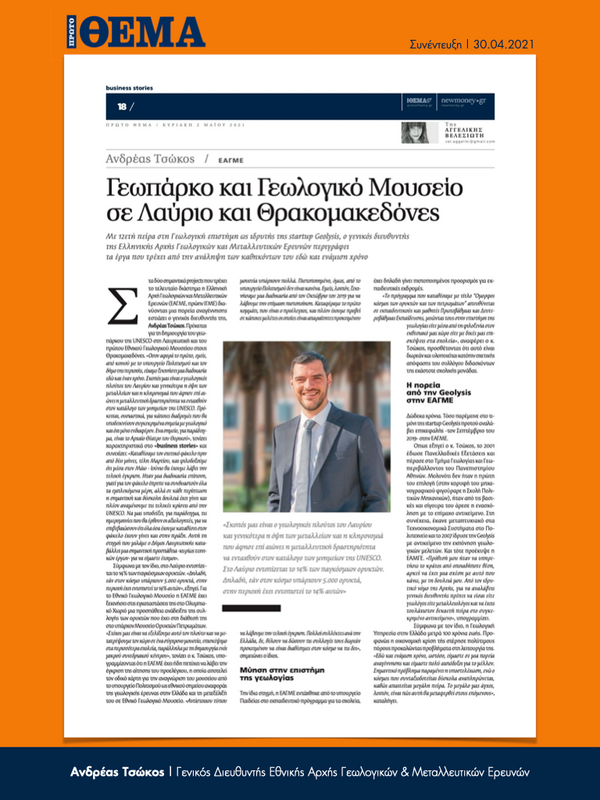Interview with H.S.G.M.E. General Director Andreas Tsokos in *Proto Thema* with journalist Angeliki Velesioti.
With 12 years of experience in geological science as the founder of the startup Geolysis, the General Director of the Hellenic Survey of Geology and Mineral Exploration (H.S.G.M.E.) outlines the key projects that have been progressing since he took office a year and a half ago.
Mr. Tsokos highlights two major projects currently under development by H.S.G.M.E., marking a period of renewal for the organization: the creation of the UNESCO Geopark in Lavreotiki and the establishment of the country’s first National Geological Museum in Thrakomakedones.
“Regarding the Geopark, together with the Ministry of Culture and the local municipality, we began the process a year ago. Our goal is to see Lavrio’s geological wealth, the striking landscape of its mines, and the legacy of its centuries-long mining activity included in the UNESCO World Heritage list. Essentially, the park will feature designated routes showcasing areas of Geology and cultural interest. One of these, for example, is the Ancient Theatre of Thorikos,” he explains in the *business stories* section, adding: “We submitted the relevant dossier at the end of March, and we hope to receive final approval by May or June. It has been a demanding process that required coordination among all parties involved, but the major part of the work has been done. Now, we are awaiting UNESCO’s final evaluation and the visit of its assessors. At the moment, the Municipality of Lavreotiki is undertaking significant technical works to ensure readiness.”
According to him, Lavrio contains about 14% of the world’s known minerals. “Out of approximately 5,000 identified minerals worldwide, 14% have been found in the Lavreotiki region,” he notes. Meanwhile, at its facilities in the Olympic Village, H.S.G.M.E. has started enhancing its existing Museum of Minerals and Rocks to evolve it into a modern, interactive National Geological Museum.
“Our goal is to transform this collection into a modern museum, open to more schools and complemented by a small conference center,” explains Mr. Tsokos, emphasizing that H.S.G.M.E. has already secured pre-approval from the Ministry of Culture — a key step toward official recognition of the museum as a national reference point for geological research in Greece. “There are many geological museums, but none officially certified by the Ministry of Culture. We began this process in October 2019, achieved the pre-approval stage, and are now completing the necessary studies for final accreditation. Many private collectors have already expressed their willingness to donate their collections to make them accessible to the public,” he adds.
Introducing Students to the Science of Geology
At the same time, H.S.G.M.E. has been officially included by the Ministry of Education in its national educational program for schools, becoming a certified destination for educational visits.
“Our program, titled ‘The Wonderful World of Minerals and Rocks’, is designed for primary and secondary school teachers and students, introducing them to geology through visits to our exhibition space or our outreach sessions at schools,” explains Mr. Tsokos, adding that participation is free and takes place following a decision by each school’s teaching staff.
From Geolysis to H.S.G.M.E.
Mr. Tsokos led the startup Geolysis for twelve years before assuming the position of General Director at H.S.G.M.E. in September 2019. He studied Geology and Geoenvironment at the University of Athens, followed by a postgraduate degree in Technoeconomic Systems at the National Technical University of Athens. In 2007, he founded Geolysis, specializing in geological studies. “My goal was always to serve the public sector in a role related to my field. According to the founding law of the Authority, the General Director must be either a geologist or a mining engineer with at least ten years of experience in the discipline,” he explains.
He adds that Greece’s Geological Service has a century-long history but was severely affected by the economic crisis. “Over the past year and a half, we’ve entered a phase of revival and are optimistic about the future. The main challenge remains understaffing, as experienced professionals retiring are difficult to replace. Our biggest concern is how to transfer this valuable expertise to the next generation,” he concludes.
Source: Proto Thema / New Money



_1628059962.png)